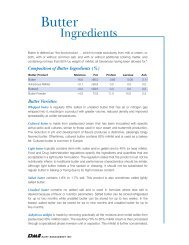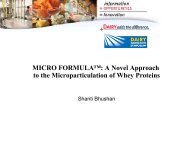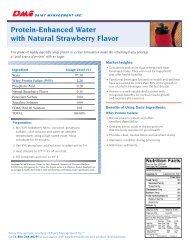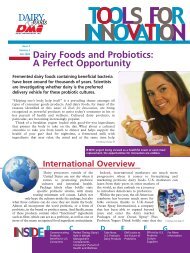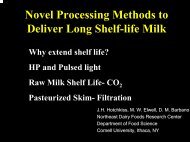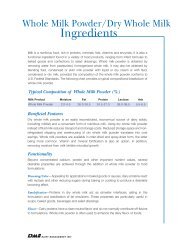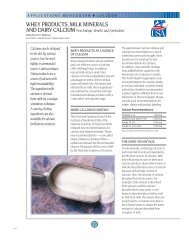Emerging Milk Protein Opportunities - InnovateWithDairy.com
Emerging Milk Protein Opportunities - InnovateWithDairy.com
Emerging Milk Protein Opportunities - InnovateWithDairy.com
Create successful ePaper yourself
Turn your PDF publications into a flip-book with our unique Google optimized e-Paper software.
The whey proteins derived directly from milk also contain less<br />
than 1 percent fat, even when concentrated to as high as<br />
80 percent protein. That accounts for their bland flavor, low turbidity<br />
in solution, foaming capability and stability during storage.<br />
“Being low in milkfat and phospholipids, whey proteins isolated<br />
directly from milk have low susceptibility to oxidation,” notes<br />
John Lucey, Ph.D., professor of food science at the University of<br />
Wisconsin-Madison and researcher at the WCDR. “Therefore its<br />
flavor tends to remain consistent even after prolonged storage.”<br />
Value-added ingredient<br />
Whey proteins derived directly from milk serve well as a highvalue-added<br />
ingredient for products that have nutritional targets.<br />
The highest-potential applications are for products in which<br />
whey protein is added for nutritional fortification of functional<br />
foods (6 percent to 7 percent protein). Substantial amounts of<br />
these whey proteins can be added with minimal effect on flavor,<br />
aroma and appearance.<br />
Benefits for beverages<br />
Burrington considers beverages a very promising application<br />
because consumers are especially sensitive to flavor and aroma<br />
in drinks. “In more highly flavored items like cookies and energy<br />
bars, the mild dairy flavor in whey proteins isolated from cheese<br />
whey usually <strong>com</strong>plements the taste,” she says.<br />
“On the other hand, in beverages, bland flavor<br />
in a protein concentrate is a positive attribute,”<br />
Burrington says. “Sensory research indicates<br />
that consumers readily detect unwanted<br />
flavors and aromas that they do not expect<br />
in a beverage.”<br />
Furthermore, with low turbidity and<br />
high solubility, whey proteins derived<br />
directly from milk can be added to<br />
clear beverages – like sports drinks,<br />
flavored waters, vitamin waters and<br />
some juices – with little or no effect<br />
on their appearance.<br />
Expanding functional foods<br />
As consumers continue to look for nutritionally enhanced food<br />
options, manufacturers can find opportunities to add protein to<br />
a wider array of foods. The bland flavor profile of whey proteins<br />
derived directly from milk also would work well as a proteinenhancer<br />
in mild-flavored foods such as yogurts, flavored milks,<br />
smoothies, white sauces and some soups.<br />
Breaking away from eggs<br />
The foaming properties of whey proteins derived directly from<br />
milk also create potential for baked goods and whipped products<br />
that traditionally rely on eggs for foaming and whipping.<br />
“Egg is currently the dominant ingredient for those applications,<br />
but whey proteins derived directly from milk are viable partial<br />
replacements for egg in many applications,” Lucey says.<br />
Choosing the right whey protein<br />
Whey proteins isolated directly from milk are not necessary for<br />
all applications. While they are suitable ingredients for products<br />
like cereals and snack bars, whey proteins isolated from cheese<br />
whey already serve those applications well, Burrington says. In<br />
baked goods, some whey proteins isolated from cheese whey<br />
impart a slight dairy flavor that enables other flavors, such as<br />
chocolate, to develop to their full potential. In sourdough bread,<br />
the distinctive flavor of acid whey has been used to enhance the<br />
flavor contributed by fermentation.<br />
“Whey proteins derived directly from milk are part of a new<br />
generation of dairy ingredients,” Burrington says. “Yet, whey<br />
proteins isolated from cheese whey will always play an important<br />
role in formulating many foods and beverages. There is still room<br />
for innovative ingredients that can help manufacturers develop<br />
enhanced products and drive further dairy ingredient usage.”<br />
These new ingredients are particularly important as the food<br />
industry tries to add higher levels of protein to their products.<br />
<strong>Milk</strong> <strong>Protein</strong> Fractionation <strong>Opportunities</strong> 3



